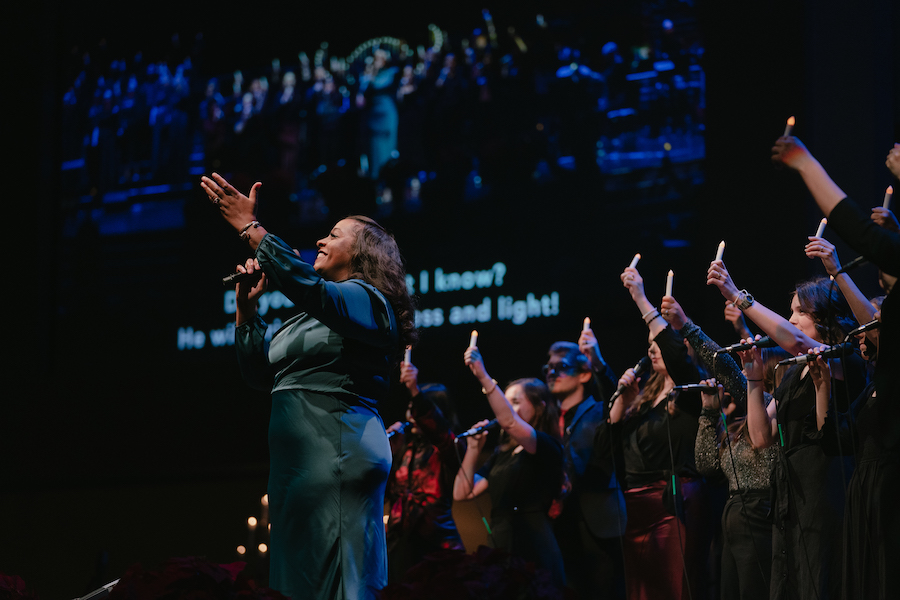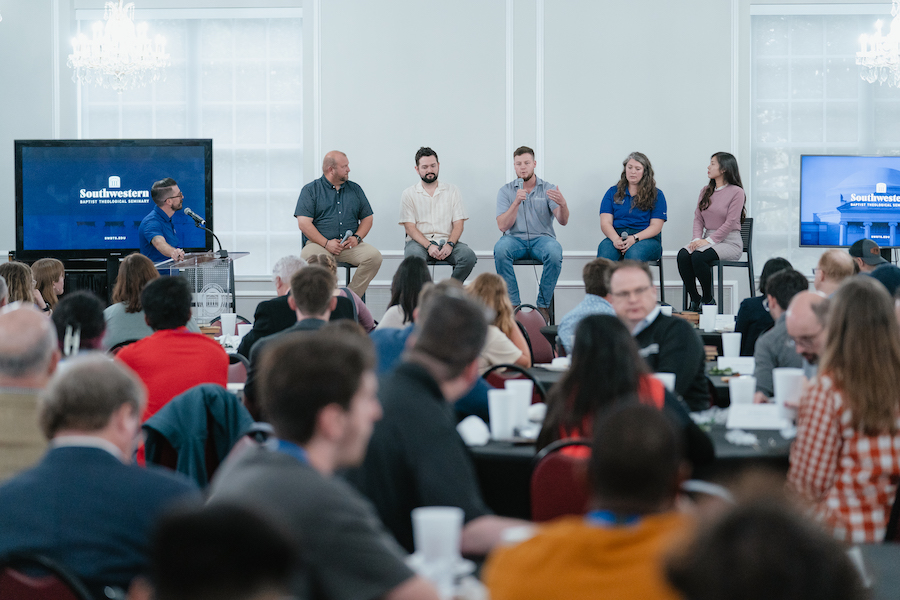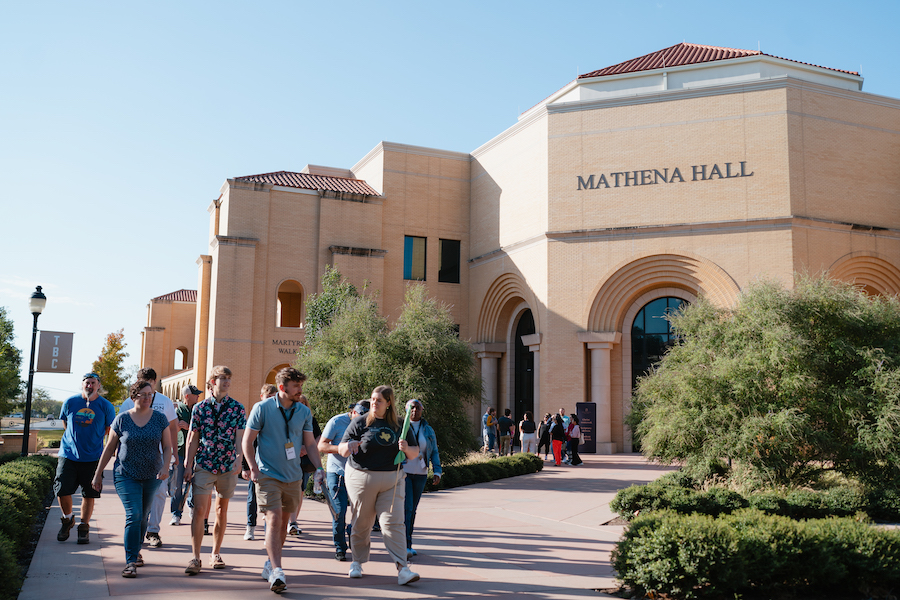Greenway tells conference church revitalization is ‘perennial’ need


With nearly 80 percent of churches in the Southern Baptist Convention plateaued or declining, church revitalization is a necessary ministry, said Kenneth Priest, interim director of the Center for Church Revitalization at The Southwestern Baptist Theological Seminary. Addressing pastors during the fully online Church Revitalization Conference, April 1, Priest said that in light of the importance of such a ministry, the conference aimed to help pastors answer the question, “Are you doing all that you can do to reach the nations where God has planted you for the purpose of advancing the Gospel?”
The conference featured multiple speakers with ties to Southwestern Seminary, including President Adam W. Greenway, who began the conference with a session titled “Biblical Revitalization.” Greenway traced the story of the church of Ephesus from Acts 20 to 1 and 2 Timothy and concluding in Revelation 2. The church’s story revealed its need for revitalization over time, Greenway said, which is “a word and reminder to us about the task of revitalization: it is a perennial one.”
“It’s a perpetual ministry,” Greenway said. “A ministry of fidelity and faithfulness to the Gospel and to the Scriptures and to our Lord is a ministry of revitalization.”
Greenway asserted that, unless someone is called to plant a church, all ministers are ultimately called to church revitalization.
“The tendency [for churches] is always going to be to drift, to become distracted, dissuaded, diverted from the purpose and the plan,” Greenway explained. “That’s why you’re there, pastor. That’s why your ministry is so critical, because you’re the one who is standing in the gap, consistently and constantly calling your people back to what matters most, back to the first things, back to the Scriptures, back to the mission.”
Greenway added that revitalization is not only a biblical calling and a biblical paradigm, but it “represents the heart of what ought to characterize the pastor of the church for the long haul.”
“Our work,” he explained, “should be always that we are committed to doing what we can to help our churches, our people, those entrusted to our care, to be the kind of people who are found faithful—faithful in terms of their life and doctrine and beliefs; faithful in terms of their ministries and their work and their duties; keeping the main thing, the main thing; always centering ourselves around the Word of God and what matters most.
“That’s what I believe is a biblical paradigm for revitalization. That’s what I believe ought to characterize us.”
Southwestern Seminary graduate Matt Henslee, senior pastor at Mayhill Baptist Church in New Mexico, also spoke at the conference, covering the topic “The Sufficiency of Scripture in Church Revitalization.” He specifically taught from 2 Timothy 3:16-4:5.
Henslee, a Doctor of Ministry student at Southwestern Seminary, noted the primary task for all church pastors: faithfully preaching the Word, and faithfully reaching the lost. All of this, he explained, comes from a foundational belief that Scripture is sufficient in every aspect of the pastor’s calling, and is what drives everything pastors do in the lives of their churches.
“We have to get after it,” Henslee said. “I have to get after it. Eternity is coming for all of us, and heaven and hell hang in the balance for all around us. So, before God and Christ Jesus, our righteous Judge, we are to preach the Word. We need to get it straight and give it straight. A faithful preacher or teacher will do nothing short of this.”
Next, conference attendees were asked to consider whether they should pursue doctoral studies while revitalizing a church. Speaking on this were Shane Parker, director of the Doctor of Educational Ministries program at Southwestern Seminary, and Coleman Ford, director of professional doctoral programs.
Opening their session, Parker asked the conference attendees, “Can you successfully revitalize your church without guidance and accountability?”
Parker explained that while these might be found elsewhere, one of the primary sources is a doctoral program. Reflecting on his own experiences in local church ministry, including two pastorates, he added, “Doctoral study really did provide exactly what I needed to be effective and more certain of what I was doing in revitalization.”
Ford outlined five reasons why a doctoral program at Southwestern Seminary might be beneficial for pastors revitalizing a church: “It connects you to a network of other like-minded ministry leaders; it trains you to become an expert practitioner in the area of church revitalization; church revitalization gives you a natural habitat or laboratory for your doctoral work; doctoral work is formative for you as a leader; and professional doctoral studies allow you to access mentors and coaches who have been part of revitalization efforts.”
To learn about Southwestern Seminary’s Doctor of Ministry in Church Revitalization, see here.
Following the discussion of doctoral program opportunities, Ken Hemphill, the seventh president of Southwestern Seminary who now serves as special assistant to the president at North Greenville University, delivered a talk on practical ways revitalization happens in the local church.
“There is an integral connection between local church health and Kingdom expansion,” Hemphill said. “There is a very real connection that if we are going to be involved in empowering Kingdom growth or expansion, then the local church health and thus revitalization is critical.”
Hemphill continued that his “absolute conviction” is that church growth is supernatural. He concluded that there are three essential steps in the process: a change of heart, a change in thinking, and ultimately a change in behavior.
Churches accomplish this in partnership with the Holy Spirit by basing everything on Scripture, being careful to distinguish between what is biblical and what is simply Baptist.
“A lot of what we cling to is more tradition-led than Bible-led,” Hemphill said. “The point is, we are not trying to please a denomination; we are trying to please the Lord.
“We have to maintain with our people, is this a biblical issue? Is this a biblical priority? And obviously, you have to keep the focus on the Great Commission.”
Matt Queen, L.R. Scarborough Chair of Evangelism, served as the conference’s penultimate speaker. Basing his presentation primarily on his book Mobilize to Evangelize: The Pastor and Congregational Evangelism (available from Seminary Hill Press here), Queen spoke on the topic “Assessing Your Church’s Evangelism for Revitalization.”
Queen built his presentation on two essential themes: first, “Outside the work and power of the Holy Spirit, a church’s pastor is the most influential factor upon its effectiveness in evangelism”; and second, “No church will exceed its pastor’s passion for and practice of evangelism. Likewise, no church will succeed in evangelism if its pastor fails to practice and have passion for evangelism.”
The primary takeaway, therefore, was for pastors to lead their churches in evangelism. Means of doing so include setting expectations (such as setting the goal for church members to share the Gospel once a month, once a week, or even once a day), and encouraging the use of guidelines for doing evangelism, Queen said. Among the guidelines Queen listed are the “homestead guideline,” which means sharing the Gospel with anyone who comes to an individual’s home (such as a salesperson, delivery man, or repairman), and the “five-minute guideline,” which means sharing with anyone with whom an individual has more than five minutes to speak (like on a flight, in a waiting room, or at a ball game).
“You can actually be effective in your evangelism without having to spend one more dollar, without having to build one more building, without having to hire one more staff person,” Queen concluded. “It just takes you being more intentional in your evangelism … by just making some little tweaks, looking at what you’re doing in evangelism, and then being intentional about it. It will make all the difference in you and in your church and in the Kingdom of God.”
Kenneth Priest, who, in addition to his role at Southwestern Seminary, serves as director of convention strategies for the Southern Baptists of Texas Convention, concluded the conference by addressing “Church Revitalization in the Midst of COVID.” Specifically, he spoke on what churches need to focus on “now, next, and beyond.”
Now, Priest said, churches must prioritize the ministry needs of church members and of the community, such as buying and delivering groceries for senior adults who cannot venture out of their homes. In addition, churches must make good use of technology for worship, small group and committee meetings, and online giving, Priest said.
Regarding “next,” Priest encouraged pastors to consider how they are going to “relaunch” their worship services.
“Just because we get the clearance to go back, to interact with people in person, and we start having worship services, we don’t need to just show up at worship on Sunday morning; we need to make an event out of this. You need to relaunch worship,” he said.
Similarly, Priest added, churches must “relaunch” their community engagement.
“As soon as you get the green light, you need to be in the community—knocking on doors, holding block parties, doing whatever you can to let the community know, ‘The church is here, we want to serve you, we’ve been praying for you, this is what we can do,’” Priest said. “… Don’t get comfortable with the fact that you’ve gone online. Make sure that you’re using this as an opportunity to reengage those who are out there in-person.”
Finally, Priest covered “beyond,” encouraging pastors to learn from the past and ensure financial reserves are well-established.
“The next time that the grass is green and the wheat is growing, we need to build up some reserves,” he said. “We need to ensure that we have enough reserves so that once we reestablish our ministry, if we have a crisis that comes again, we’re prepared for it.”
Priest specifically recommended having four to six months of reserves for fixed expenses. “God teaches us to be wise stewards,” he said. “We need to store up for the rainy day and make sure that we’re prepared for those times.”
Other speakers at the day-long event included Bob Bickford, lead pastor of the Groves Church in St. Louis, Missouri; James Womack, senior pastor of Destiny Church in Fort Worth; and Kyle Bueermann, senior pastor of the First Baptist Church in Alamagordo, New Mexico.
To view each of the Revitalization Conference sessions, see here.



